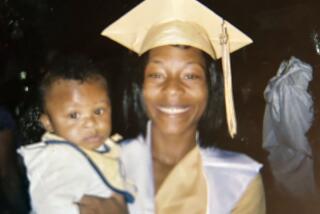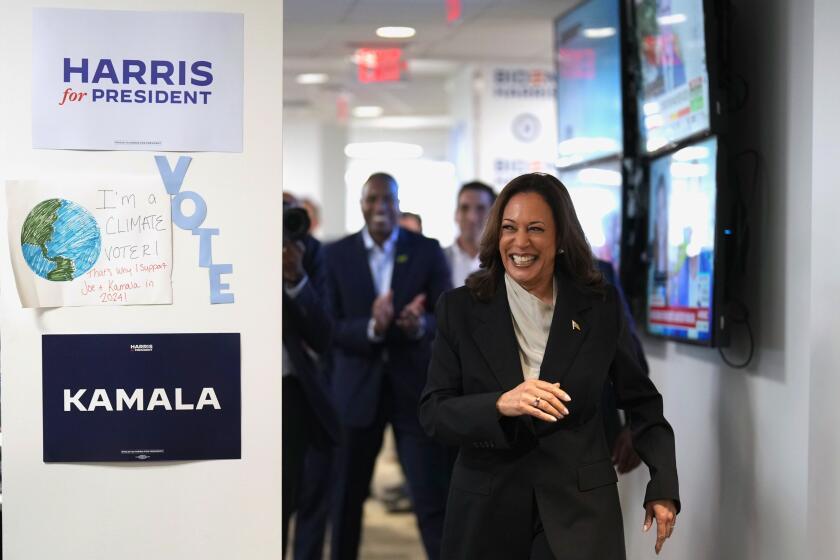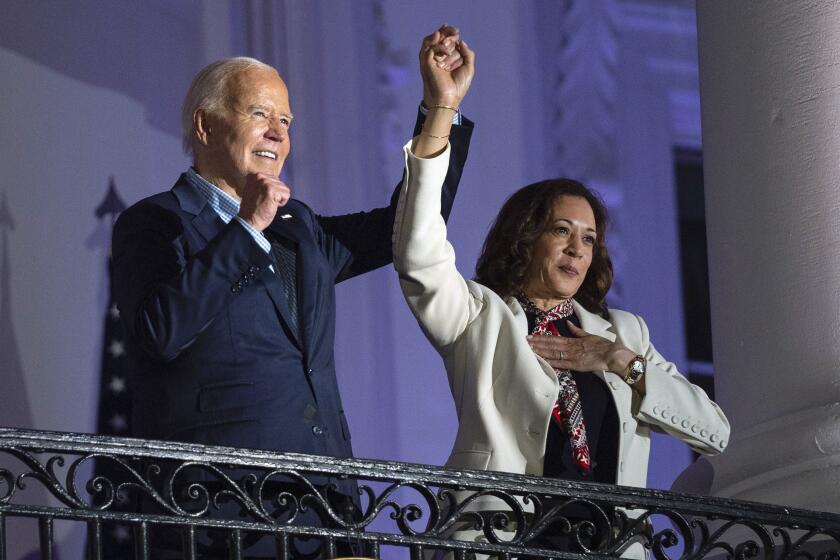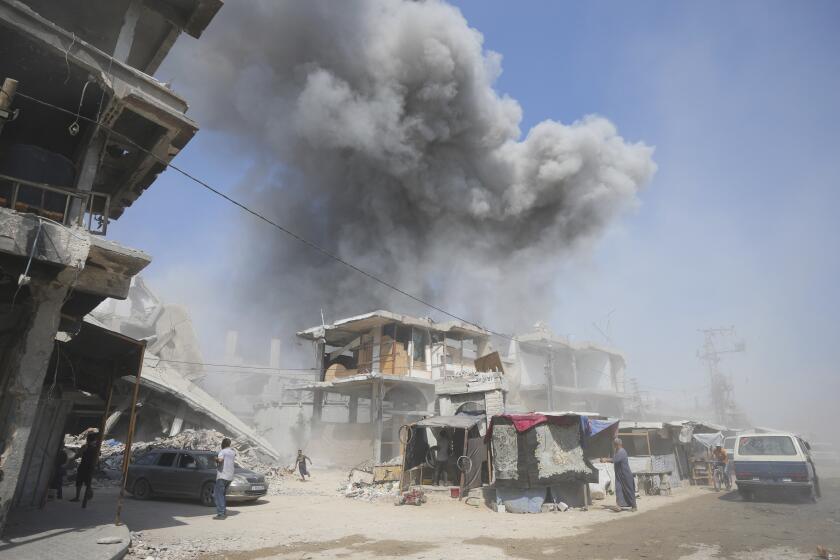Imelda Marcos Acquitted : Cleared of Looting Philippines to Buy N.Y. Skyscrapers : Khashoggi Also Freed in Blow to Justice Dept.
In a verdict that electrified the courtroom, former Philippine First Lady Imelda Marcos was acquitted today of looting her homeland’s treasury of $222 million to buy New York skyscrapers, jewelry and art.
Adnan Khashoggi, the jet-set Saudi businessman once described as the world’s richest man, also was cleared of two counts that accused him of helping Marcos hide ownership of the property.
The decision--on Marcos’ 61st birthday--came midway through the jury’s fifth day of deliberations. It capped a three-monthlong trial. She was acquitted on all counts.
As the jury forewoman read the first innocent verdict, Marcos supporters cried out in happiness, ignoring U.S. District Judge John Keenan’s warning against outbursts. Marcos was in tears. She smiled and hugged her lawyers. Others in the courtroom were hugging and crying.
The prosecutors sat facing the judge, eyes downcast.
The verdict was a crushing blow to the U.S. government, which had taken the unusual step of prosecuting a wife of a former head of state who had sought sanctuary in the United States.
As she left the courthouse in a crush of reporters, Marcos said: “A great burden is lifted. I’m glad it’s over.” She appeared to be weeping as she walked down the steps, and she added: “Thank you. Thank you. God bless America.”
Khashoggi, smiling broadly, said, “I believe in the American system where people can decide the fate of an individual.”
A Muslim, he said he planned to leave New York to go to Mecca, the holy city of Islam, where pilgrims are gathering now.
If she had been convicted on all four counts--racketeering, racketeering conspiracy, mail fraud and obstruction of justice--Marcos could have faced up to 50 years in prison and $1 million in fines. Khashoggi could have drawn a sentence of 10 years and a $500,000 fine on two counts--mail fraud and obstruction of justice.
Marcos had been accused of conspiring with her late husband, former President Ferdinand E. Marcos, to buy art, jewelry and four Manhattan commercial buildings with money stolen from their country. It was charged that much of the millions of dollars came in kickbacks Marcos collected from government contractors.
Ferdinand Marcos also was indicted in October, 1988, but was ruled too ill to stand trial. He died in Hawaii last September.
Mrs. Marcos’ flashy attorney, Gerry Spence, of Jackson, Wyo., conceded she was a “world class shopper,” but said she did not know the source of her husband’s wealth. In his closing argument, Spence said she was guilty only of loving and supporting her husband.
Witnesses testified that the money was funneled to the United States through numbered bank accounts in Switzerland, Hong Kong, Manila and Los Angeles and was used to secretly buy the buildings for the Marcoses through nominees and offshore corporations.
The alleged offenses took place in the latter part of Marcos’ two decades as president of the Asian nation. Marcos was deposed in February, 1986, by a “people’s revolution” led by Corazon Aquino, widow of a murdered Marcos opponent. She became Philippine president as the Marcoses fled to exile in Hawaii.
Carmen Pedrosa, a spokesman for the Philippine government, said in a hastily written statement issued here that even though Mrs. Marcos was acquitted, the trial showed that her late husband’s regime was rife with “unbridled corruption and total abuse of power” and a ban on her returning to the country remains in effect.
The federal prosecutor’s office issued a statement saying that “our system of justice has spoken” and that the team of prosecutors who tried the case had done a good job.
Khashoggi, 54, is a financier and arms dealer who divides his time between homes in New York, France, Saudi Arabia and other locales. He played a middleman role in the Iran-Contra scandal, in which U.S. arms were secretly sold to Iran by officials of the Reagan Administration and the profits diverted to the U.S.-backed Contra rebels in Nicaragua.
The trial, which began in late March, involved 95 witnesses, all called by the government.
It filled 5,900 pages of transcript and included bank records, receipts, letters, diaries and phone logs as evidence. Some of the key documents were recovered at Manila’s Malacanang Palace after the Marcoses fled.
The testimony was highlighted by witnesses’ accounts of Mrs. Marcos’ shopping habits, including spending sprees at Bloomingdale’s and numerous New York jewelry stores. Witnesses also said she used close friends and a secretary to handle purchases and deliveries of large amounts of cash for her expenses.
The New York branch of the Philippine National Bank was described as her “personal piggy bank,” and its manager called himself the “satchel man” who carried a valise containing $100,000 when he accompanied Mrs. Marcos’ entourage to a state funeral in South Korea.
The prosecution claimed its evidence, though heavily circumstantial, proved that as a Cabinet minister and mayor of Manila, Mrs. Marcos would have had knowledge of Marcos’ corrupt practices.
The basic allegation of the racketeering charges was that Mrs. Marcos violated U.S. laws against wire fraud and the transfer of stolen money into the United States.
More to Read
Sign up for Essential California
The most important California stories and recommendations in your inbox every morning.
You may occasionally receive promotional content from the Los Angeles Times.






